'I don't want to work with humans': These women prefer to work with the dead than the living


 PUBLISHED ONJuly 17, 2021 1:57 AMByCandice Cai
PUBLISHED ONJuly 17, 2021 1:57 AMByCandice Cai"The living are more scary than dead people," said Sarah Ang, 36, a funeral director and embalmer at Serenity Casket & Funerals, a company she runs together with her husband, Elson Chong.
It is a point that her staff, Justine Ann, 32, agrees with. The trained nurse and former hospitality staff made the switch to the funeral services industry and an embalmer for one main reason — "I didn't want to work with humans".
Justine is among Sarah's all-female team of four embalmers including herself, half of whom are in their 20s. Fellow trainee Lim Yi Huey is 25, while Sarah's sister-in-law, 27-year-old Nicole Chong, has more than seven years of experience as an embalmer under her belt.
Their 'office' is a small room with two steel tables side by side, each against the wall, with a sink and apparatus at the other end. Even with my face mask on, a faint smell of disinfectant lingers in the air.
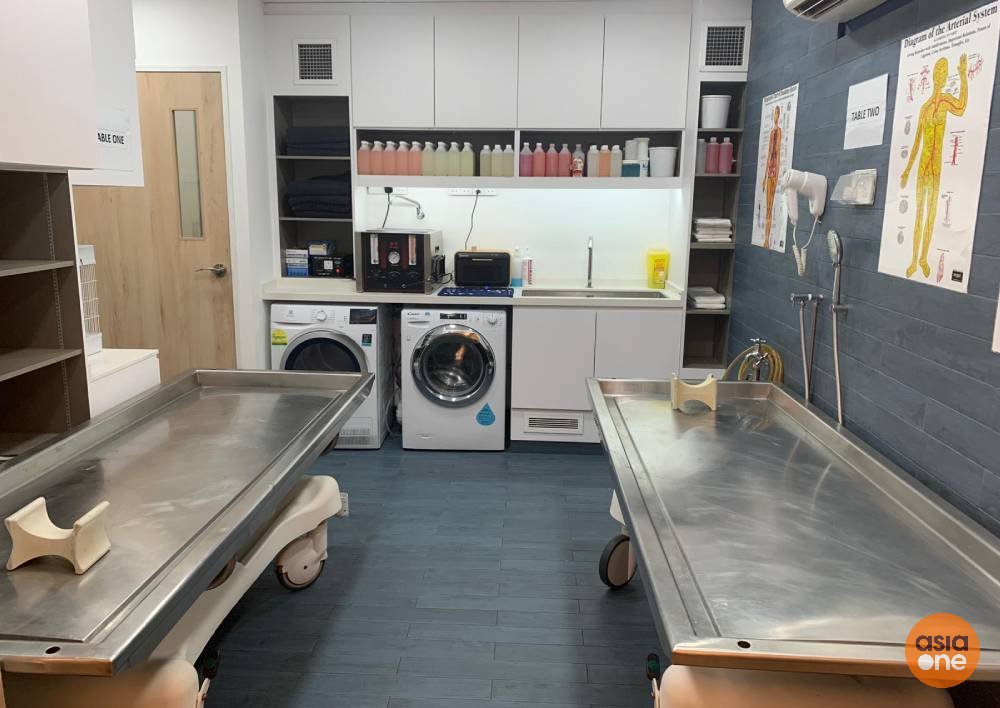
They may be Singapore's first all-women embalming team, but 'garang girls' may well be a fitting alternative nickname. Don't expect any spooky stories or superstitious beliefs from them. "It's usually humans who scare other humans," quipped Sarah, who has embalmed more than 3,500 cases so far.
Sarah had a head start in the business as the daughter of the late "King of Caskets" Ang Yew Seng, who died when she was 19. Her older sister happens to be Ang Jolie Mei, who is known to be one of the first few female funeral directors in Singapore.
Like Jolie, Sarah too decided to step into the funeral industry despite her mother's objections.
In a highly unusual move for that generation, her mother took over the business after her dad died. "I would say my mum was one of the pioneer women in the funeral business herself," said Sarah, who obtained her embalming certification in New Zealand back in 2014. Currently, Singapore doesn't require embalmers here to be certified and many like Nicole have picked up their skills on the job.
"When I was in New Zealand studying my mum didn't talk to me for one whole year," said Sarah, as her mother knew how tough it was to be in the business and didn't want her children to struggle as she did.
Back when Sarah was in her early 20s, the industry wasn't deemed a suitable place for a woman.
Of the rude shock she got when she started out: "I got my hands slapped away by an uncle once. He said 'don't touch the body, you are dirty'."
Sarah also recounted how in the early days, families of the deceased didn't want to talk to women. "One client told my mother and I 'to go and get a guy to talk to me'."
Things have changed in the past five years, however, and Sarah has observed that more young people have the interest to join the industry. "My friends would say 'wah, you dare, I don't dare', that kind of thing," said Yi Huey, who's the youngest in the team.
"Everyone is hiring young people these days and they are more accepting of our job. Even if they wanted to join last time, their families might not allow it," noted Sarah.
And there are more women now too, "from maybe three per cent to 30 per cent", which is a huge jump.
But still, "there are hardly any females on the embalming side", added the mother of two aged five and four.
The job is far from glamorous, and naturally, those who are squeamish need not apply. It is often back-breaking work, with embalming sometimes taking place in the wee hours, depending on the urgency of the family's requirements.
For Yi Huey, what drew her to embalming was her interest in the human body. The poly graduate in pharmaceutical science wanted to be a forensic pathologist, but it required "too much studying".
"I came across embalming, which I thought could help a dead person in their final journey, so I decided to join the funeral industry," said the married mother of one.
She had been a dental assistant previously but found the job boring, as she was "doing the same thing every day".
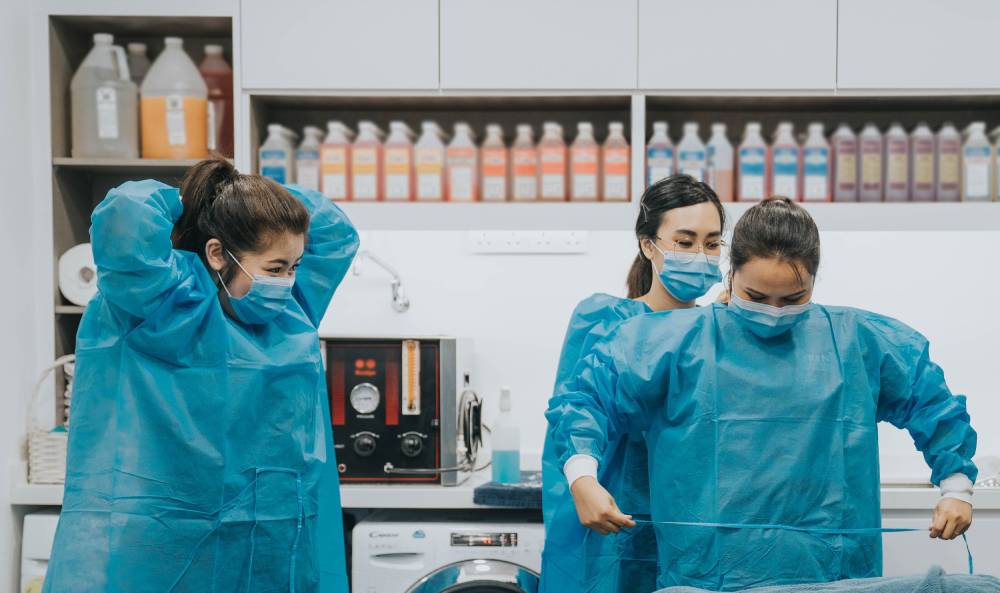
Embalming a body solo takes up to two and a half hours depending on the complexity, and it can get busy with up to six cases on some days, explained Sarah. "And usually after we finish our work, we'll get very hungry.
"People think that after embalming you will lose your appetite, but no, we eat a lot," laughed Sarah, with the other three nodding in agreement. They pinned their healthy appetite down to the odd hours at which they get to have their meals, as well as the physical demands of the job.
But that doesn't mean that men would have a leg up as an embalmer. Sarah reflected that most of the men in the business, including Nicole's husband, have not expressed any interest in becoming an embalmer. Pondered Nicole: "Maybe they lack the gentle touch (that's needed as well)."
There are techniques in embalming which don't require you to use a lot of strength, said Sarah. That explains how Yi Huey, who stands at 1.59m and weighs a slight 44kg, is still able to do the job well.
"For her size, she is surprisingly strong," Sarah added.
But Nicole recounted an amusing incident at the start, when Yi Huey had trouble turning a body over. After a few seconds of pushing, Nicole turned around to see the body still stationary while Yi Huey was stuck in place, "doing the moonwalk".
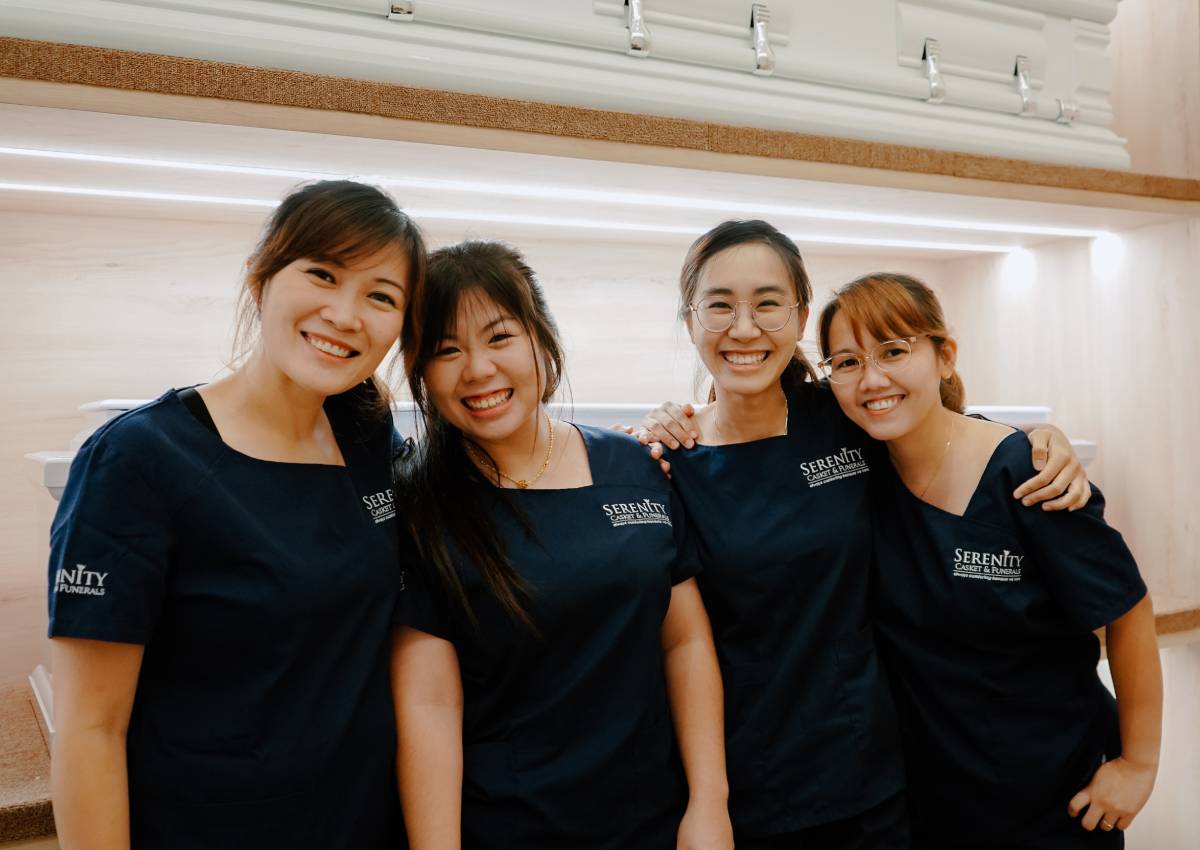
Motherhood has also not stopped them from working, even when pregnant. All members of the team pull dual roles as embalmers as well as funeral directors or customer service, which helps them have a more well-rounded understanding of the business, shared Sarah.
But a pregnant woman working in the funeral business would not only be seen as inauspicious by most, it raises ethical questions as well.
Nicole recounted how she was asked to go to the mortuary "to pick up a stillborn case" at Thomson Medical Centre while she was there for a pre-natal check-up, which was "quite awkward". "You will try to hide your tummy, but sometimes it's difficult," said the mother of two girls aged three and one.
As a funeral director, Yi Huey was also assigned to handle several stillborn cases when she was pregnant, which Sarah swiftly put a stop to. "Because it's not healthy mentally for a mother to go through," explained Sarah.
And it might be sensitive for the families of the cases as well. Added Yi Huey: "When I went to take the case, the father saw my tummy and he was also a bit shocked that a pregnant lady came over."
Sarah herself continued working through her pregnancies, stopping only the day before her scheduled C-section for her first child. "I'm a bit of a workaholic, I can't sit still," she explained.
She pushed through even after a scare during her first pregnancy when she suddenly started bleeding at the five-month mark. Her gynae apparently had no idea how physically demanding the job actually is, said Sarah.
Embalming involves washing the body, injecting the arteries with chemicals for preservation, as well as dressing and preparing the body to be placed in the casket. For Sarah and team, they double up as morticians as well, doing the hair, make-up and even nails for the deceased.
In a sign of how times have changed, Sarah has replaced regular nail polish with gel polish for greater speed and efficiency, complete with UV lamps to set the gel on the nails. As such, the embalming room sometimes takes on the atmosphere of a manicure parlour, joked Sarah.
And no request is too difficult nor bizarre, said Sarah, recalling a case where the client had wanted the deceased's hair to be not just dyed, but bleached before being streaked with highlights.
"I didn't know if [the deceased] was sensitive to all this… what if all her hair dropped off?" said Sarah. "So I had to do a lot of checks with the funeral director, such as asking the client whether the deceased had dyed her hair before."
But all that they asked was that Sarah take her time, "and they told me, 'we will wait'", which caused her stress levels to skyrocket even further.
With the help of her sister-in-law Nicole, they took up the challenge which turned into an experiment of sorts, but it also helped them to gain from the experience. "We just made sure we did our best, then we prayed," said Sarah. Thankfully, the pair managed to nail the look that the family wanted.
However sometimes, there is an internal struggle as to whether to do as the client says, even if the resulting look does not sit well with them.
"There was one case that I didn't feel good about even after I was done," said Sarah. The client, whose mother had passed on, wanted a particular style of make-up that was highly unusual.
"The daughter said she wanted 'very red' blush applied in a circle on her mother's cheeks," said Sarah, which she found odd but acceded to. Then came another request: "She wanted her to have red lipstick applied, but only on the centre of her lips."
Despite having the image of a 'Chinese vampire' or paper doll offering floating up in her head, Sarah pushed the thought aside and did as her client wanted.
"Best of all, the last request was for 'blue eyeshadow'. I asked if she was sure, and she said yes, her mother always did her make-up like that.
"It's a case I'll never forget. I told my husband, to be frank any guest who goes to the wake will surely get a shock and they might complain."
Another particularly challenging case which pushed Sarah to near breaking point was a death that occurred out at sea, on a cargo ship.
"Our operations team actually spent six hours at sea, whereby they had to climb a ladder up from a smaller boat. It's quite challenging because if you drop, it's the deep sea already."
The crew had managed to get the body down but it was already severely decomposed. But the "scary part", according to Sarah, was that the body of the Lithuanian was placed in the same freezer that the crew used for their food.
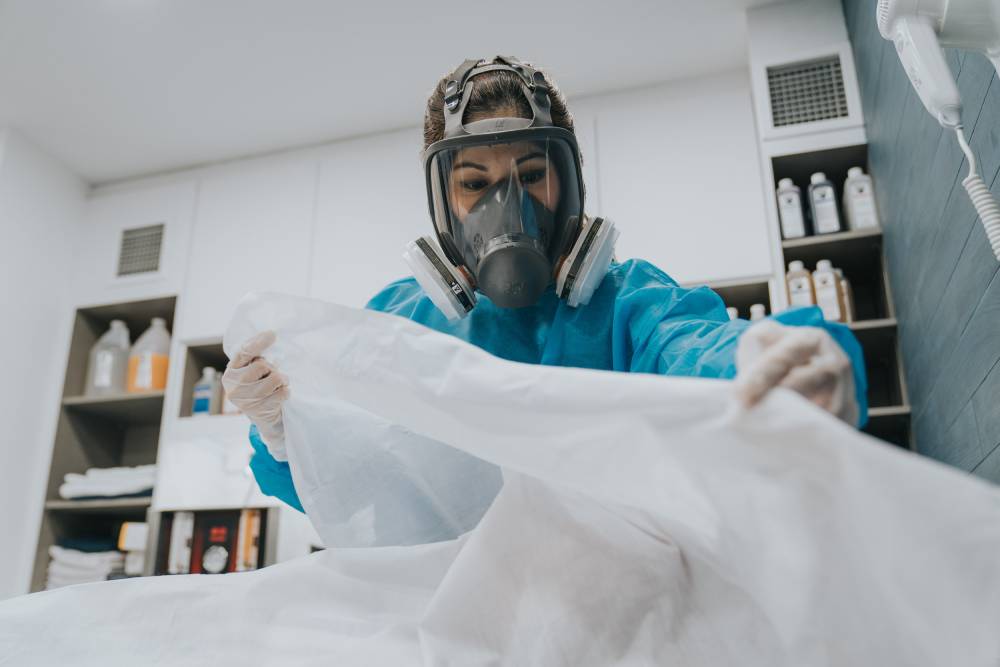
"When the body came back, it had to go for a private autopsy, so there was a delay of three or four days, with the body already severely decomposed."
When the body finally arrived to be prepared, "the smell was so overwhelming, I asked my guys to find joss sticks (to place around the body).
"I had the full mask on but I could still smell it," said Sarah. She added that due to the decomposition, the skin "had already started to slip off" and all they could do was wrap the body to contain the fluid from leaking.
With the younger generation seeing their job as "cool" rather than one to be abhorred, Sarah acknowledged that the mindsets of many have shifted, but Singaporeans are still more pantang (superstitious) about how funerals should be done here.
"In New Zealand I had embalmed a five-year-old kid before putting the child back in his bed at home.
"The siblings just went around and played with him, as if he's just sleeping there, but I don't think it'll happen in Singapore."
However, some practices are encouraged here, such as touching the body of the loved one before their final send-off.
"I tried to adopt a lot of the New Zealand style in the way we do things, such as also allowing families to do the make-up of the deceased if they request for it," said Sarah.
"We encourage the families to touch too, like touching the hair, touching the hand, so that they will have a better farewell."
More than physical strength, inner strength is needed when it comes to handling the emotional demands of the job. After handling so many cases, Nicole confessed that they "don't really cry or tear up", as it is important to "not have any attachment" to the bodies that come in.
But as mothers, it is tougher when the cases they see are children.
When Nicole had to embalm a five- or six-year-old boy who had died due to an illness, a procedure like raising an artery, which would usually take less than five minutes, took her around 15 minutes. "In my mind I kept thinking about my kid," confessed Nicole, a mother of two.
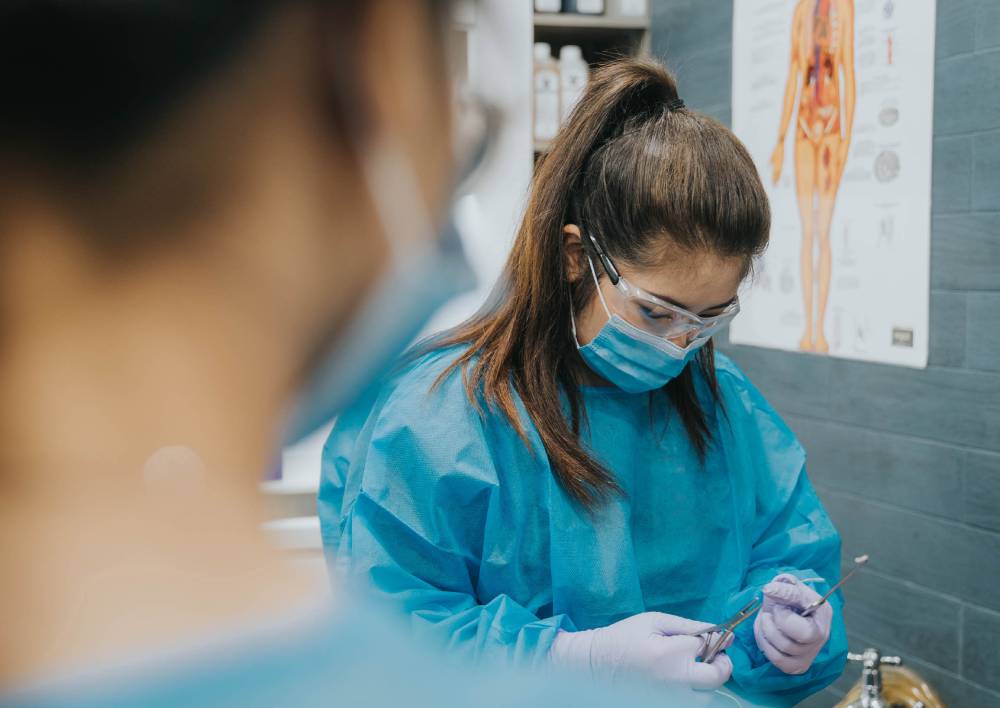
The job has also made them treasure life a little more, especially in spending time with their children and loved ones.
"Now, I treasure the time with my kids and family a lot," said Sarah. "For example last month my grandmother passed away, which made me reflect that I didn't spend enough time with her. I started to think I needed more work-life balance. Otherwise, it's a wasted life."
[[nid:466316]]
"It's the same for me," added Nicole. "On my off days I will try to go to my grandparents' house, even if I do nothing there. It's just to accompany them."
"For me, you'll never know when you're going to die, so we have to live fully," said Sarah, who has also prepared her funeral photo which she updates regularly, should "anything happen".
Her husband, however, is uncomfortable whenever she brings it up, even though she reminds him, "Eh you're a funeral director leh, you have to accept [that death will happen]."
But unlike the men around them who are surprisingly nervous over the topic of death, Sarah feels that as embalmers, they have a deeper perspective because "they have seen a lot and are more hands-on" in their practice.
"They (their husbands) are the more sensitive kind and we are more YOLO (you only live once)," joked Nicole.
candicecai@asiaone.com